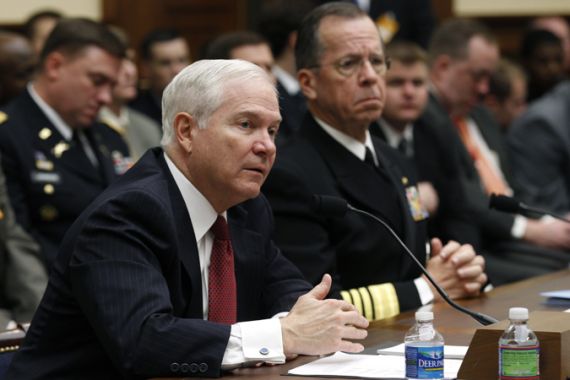Gates: US should not train Libyan rebels
The comments underscore the intensity of the debate in Washington about what to do next in Libya.

 |
| Mullen, chairman of the US military’s Joint Chiefs of Staff, said coalition strikes had taken a toll on Gaddafi’s loyalists but he signaled a long struggle ahead [AFP] |
US Defence Secretary Robert Gates has said it should not be up to Washington to train and assist Libyan rebels or do nation-building after any fall of Muammar Gaddafi, jobs better left to others.
Gates comments on Thursday came during a day of tense testimony to Congress as legislators questioned whether the United States might deepen its involvement in Libya, where poorly organised rebels are struggling against better armed loyalist forces.
Gates agreed that rebel forces needed better training and organisation but played down prospects the United States would directly assist them.
“In terms of providing that training, in terms of providing assistance to them, frankly, there are many countries that can do that,” Gates said.
“That’s not a unique capability for the United States. And, as far as I’m concerned, somebody else should do that.”
The comments underscored the intensity of the debate in Washington about what to do next in Libya. The Obama administration had previously declined to rule out the possibility of arming the rebels.
Limited mission
Gates stressed the limits of US military action, saying no US troops would deploy in Libya while he was in the job and that ousting Gaddafi was not part of the mission.
“I am preoccupied with avoiding mission creep and avoiding having an open-ended, very large-scale American commitment,” Gates said.
He also played down any major US role in a post-Gaddafi Libya, saying “the last thing this country needs is another enterprise in nation-building.”
“My view is that the future of Libya — the United States ought not take responsibility for that, frankly,” he said.
‘Weakened but not debilitated’
The top US military officer, Admiral Mike Mullen, acknowledged in his testimony that the Libyan leader was not close to a military breaking point despite nearly two weeks of coalition air strikes.
Gaddafi’s forces have used superior arms and tactics to push back rebels trying to edge westward along the coast from their stronghold of Benghazi toward the capital Tripoli.
Mullen, chairman of the US military’s Joint Chiefs of Staff, said coalition strikes had taken a toll on Gaddafi’s loyalists but he signaled a long struggle ahead.
“We have actually fairly seriously degraded his military capabilities … We’ve attrited his overall forces at about the 20 to 25 percent level,” Mullen said.
“That does not mean he’s about to break from a military standpoint because that’s not the case.”
The rebels have said too much reliance on foreign military support would undermine their credibility and stressed they do not want foreign “boots on the ground.” But they have appealed for arms to knock out Gaddafi’s heavy weapons and tanks.